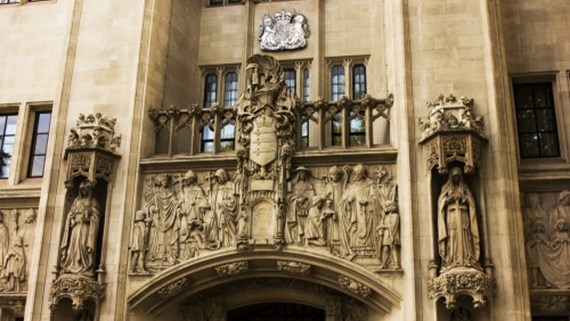Singularis v Daiwa: first Supreme Court case to uphold a claim for breach of the Quincecare duty of care
Insight

In an important decision for the financial services sector, the Supreme Court has confirmed that a financial institution which executes a dishonest instruction to transfer funds out of a company’s account cannot escape liability on the basis that the instruction was given by the company’s controlling shareholders and directors.
The case of Singularis Holdings Ltd (In Official Liquidation) v Daiwa Capital Markets Europe Ltd [2019] UKSC 50 is of significance because it is the first case in which the Supreme Court has upheld a claim for breach of the Quincecare duty of care. It has also provided important clarification of the test for determining when the actions of a director/shareholder can be attributed to a company.
Daiwa had appealed against the earlier decision of the Court of Appeal on the grounds that:
- the actions of a company’s controlling mind and owner should be attributed to the company; ie the dishonest instruction given by Singularis’s owner and director should be treated as having been given by Singularis itself, rendering Singularis fraudulent, and
- if attribution was established, Singularis’s claim against Daiwa should be defeated on the grounds of illegality, lack of causation or because its claim would be negated by an equal and opposite claim against Singularis for deceit.
Delivering the unanimous judgment of the Supreme Court, Lady Hale dismissed Daiwa’s appeals and upheld the decision of the lower courts. We consider below the background to the decision and the consequences for financial services providers.
The Quincecare duty
There is an implied term in contracts between financial institutions and their customers that the institution will not execute its customer’s order if it knows or is put on inquiry that the instruction may have been given dishonestly.
In particular, a financial institution will be under a duty to block a payment if it has reasonable grounds for believing that the payment is in fact an attempt to misappropriate funds from its customer’s account. When “on inquiry”, it becomes subject to a positive duty to take reasonable steps to investigate the potential fraud.
This duty is named after the 1992 case of Barclays Bank Plc v Quincecare Ltd in which it was first identified. It was affirmed by the Court of Appeal in Lipkin Gorman v Karpnale which held that the duty would be triggered, “if a reasonable and honest banker knew of the relevant facts, he would have considered that there was a real or serious possibility, albeit not amounting to a probability, that its customer might be defrauded”. The Court of Appeal also noted in that case that, due to the sheer volume of payments made by banks every day, it would only be “in rare circumstances” that a banker would breach its duty.
The facts of Singularis
Singularis was a Cayman company set up as an investment vehicle for Maan Al Sanea, a Saudi Arabian businessman. Mr Al Sanea was the sole shareholder, a director and the chairman, president and treasurer of the company. He had full control of the signatory powers over the company’s bank accounts and was its “directing mind”. There were six other directors, but none of the six exerted control over the company.
Singularis held an account with Daiwa Capital Markets - the subsidiary of a Japanese investment bank - which contained cash totalling US$204m. These funds were the proceeds of sale by Singularis of various shareholdings.
Over the course of 2009, Mr Al Sanea instructed Daiwa to make five payments which effectively emptied the company’s account. However, there was no proper basis for any of the payments, and they had the effect of diverting the company’s funds away from its creditors. The company entered liquidation in September 2009 as a result of a compulsory winding up order made by the Grand Court of the Cayman Islands.
Singularis’s liquidators brought proceedings against Daiwa for the full amount of the transfers of the payments on the basis (1) that Daiwa had dishonestly assisted in Mr Al Sanea’s breaches of fiduciary duty to Singularis in misapplying the company’s funds; and (2) breach of Daiwa’s Quincecare duty of care to the company by giving effect to the payment instructions.
The decisions of the lower courts
In 2017, the High Court dismissed the claim based on dishonest assistance but found “without hesitation” that Daiwa had acted in breach of its Quincecare duty by making the payments in question without proper (or indeed any) inquiry. In a judgment which was scathing about the level of care exercised by Daiwa, Rose J noted that “Any reasonable banker would have realised that there were many obvious, even glaring, signs that Mr Al Sanea was perpetrating a fraud on the company when he instructed that the money to be paid to other parts of his business operations. He was clearly using the funds for his own purposes and not for the purpose of benefiting Singularis.”
The “red flags” highlighted by Rose J included the following:
- The senior management of Daiwa were well aware that Mr Al Sanea was in “dire financial straits”. His assets had been frozen by the Saudi authorities and there were reports in the press about the withdrawal of credit facilities and the need for his group of companies to restructure its very substantial debts. The credit rating for the group had been withdrawn by Moody's and S&P. As the Judge noted, “It is hard to think of what clearer indication there could have been that Singularis was in a very precarious financial state”.
- Daiwa’s management had decided to close down the relationship with the group notwithstanding that that move could potentially expose them to later legal challenge. This showed the lengths to which they were prepared to go to avoid loss from the potential collapse of the group.
- Daiwa was aware that Singularis may have had other substantial creditors with an interest in the money held in their account, and there was no basis for Daiwa to assume that Singularis would emerge from its financial difficulties with no creditors looking to the excess money in the Daiwa account.
- There was “plenty of evidence” to put Daiwa on notice that there was something “seriously wrong” with the way that Mr Al Sanea was operating the Singularis account, including the payment of US$80 million into the account shortly after his other accounts had been frozen. with Daiwa. The court suggested that this should have led Daiwa to the “obvious conclusion” that Mr Al Sanea intended to use unfrozen Singularis account to bypass the restrictions imposed on the Group by the Saudi authorities.
- There was a sudden appearance of previously unheard-of contracts and questionable paperwork to justify the payments out of the account. Daiwa proceeded notwithstanding obvious oddities and inconsistencies between the contracts and what they had previously been told.
The court found that Daiwa had been negligent and ordered it to pay damages to Singularis’s liquidators equivalent to the sums transferred out of the account, less a 25 per cent reduction to account for Singularis’s contributory negligence.
Daiwa appealed to the Court of Appeal on limited grounds. It did not challenge the finding that there had been a breach of the Quincecare duty of care, but focussed primarily on the question of whether a defence of illegality is available to allow a financial institution to defeat a claim in negligence and breach of contract brought by its corporate customer.
In 2018 the Court of Appeal unanimously dismissed the appeal, upholding the High Court’s finding that Mr Al Sanea’s fraudulent state of mind could not be attributed to Singularis. However, the Court of Appeal held that, even if Mr Al Sanea’s actions could have been attributed to Singularis, Daiwa’s defences would not have defeated the claim.
Daiwa then appealed to the Supreme Court, again seeking to defeat the claim on the basis of attribution and illegality.
The Supreme Court’s decision
The Supreme Court held that a financial institution owes a Quincecare duty to its customer even in circumstances in which the instructions which led to the loss were given by a person as closely connected with the company as was the case with Mr Al Sanea.
Its rationale was that the fraud should not be attributed to Singularis because it was a distinct legal entity, separate to its shareholder and directors. Although a company must act through the medium of real human beings, the actions of those real human beings are attributed to the company only if those actions are in line with the company’s constitution, its articles, rules of agency or vicarious liability or other rules of law.
The context of the case was highly relevant to the question of whether the fraudulent state of mind of a company’s “directing mind” should be attributed to the company. Here, the context was an enquiry into whether Daiwa had breached its Quincecare duty, the purpose of which is to protect the company against just the sort of misappropriation of its funds as had taken place. By definition, this is done by a trusted agent of the company who is authorised to withdraw its money from the account.
The Supreme Court upheld the finding of the lower court that - if Daiwa’s arguments were accepted and the fraud of Mr Al Sanea should be attributed to his company - the effect would be to “denude the [Quincecare] duty of any value in cases where it is most needed”.
Implications for financial institutions
The facts of Singularis v Daiwa are so extreme that the decision offers relatively little by way of practical guidance for financial institutions exercising judgment in relation to less obviously fraudulent payment instructions. However, we set out below a number of broad conclusions to be drawn:
- the Quincecare duty extends beyond banks, to other entities which hold assets on behalf of customers and follow payment instructions;
- the duty does not require a bank to become paranoid about the honesty of those it does business with in normal circumstances. But it does require financial institutions to do more than accept at face value whatever strange documents and implausible explanations are proffered by the officers of a company facing serious financial difficulties;
- financial institutions should exercise particular care when executing payment requests made by individuals and companies in a difficult financial position. The demands of potential creditors should be borne in mind. It is appropriate to consider introducing procedures to deal with payment instructions from customers who are at risk of insolvency, subject to freezing injunctions or otherwise “risky”;
- oddities and inconsistencies in documents and behaviours are potential red flags;
- the court will pay great attention to the information available to a financial institution when determining whether it is “on inquiry” of a potential fraud. This extends to information held at various levels within an organisation and information which is publicly available. It may not be an adequate defence to say, in response to a failure to suspend and investigate an instruction, that the documents on a customer file did not disclose a problem. It may be appropriate to consider how information is recorded and compiled; and
- the expectations of institutions providing a more bespoke, less volume-based, service may be higher.
It appears to have been a straightforward matter for the judge at first instance to conclude that Daiwa was in breach of the Quincecare duty where there were “glaring” signs that Mr Al Sanea was perpetrating a fraud and it did nothing to intervene. This conclusion was not appealed, and comments made by the Court of Appeal and the Supreme Court indicate that they shared the view of the High Court. Indeed, Lady Hale described the case as “bristling with simplicity”.
The courts have in this case and others acknowledged the risk of placing too heavy a burden on financial institutions through the imposition of this duty. In Lipkin Gorman, the Court of Appeal recognised the volume of payments handled by banks and deliberately set a high threshold for the triggering of the duty. This was described by the High Court in Singularis as a “carefully calibrated” threshold, seeking to balance the competing interests of the customer and the bank as the two victims of the deceit.
In this context, Daiwa was atypical. It was not a bank, administering hundreds of accounts with thousands of payment instructions every week. The court considered that it was not impractical to expect Daiwa to look carefully at the instructions that were given for payments out of the account and, indeed, they were aware that they needed to do so. Daiwa had a complex commercial relationship with Singularis and had a deep understanding of its financial position and that of Mr Al Sanea. The expectations of Daiwa were therefore higher than they might have been for a bank operating a more “standard” banking relationship.
Against that background, whilst the Supreme Court has signalled obvious support for the Quincecare duty, Singularis v Daiwa should not open the floodgates.
If you require further information about anything covered in this briefing, please contact Kate Allass, Sally Mantell, or your usual contact at the firm on +44 (0)20 3375 7000.
This publication is a general summary of the law. It should not replace legal advice tailored to your specific circumstances.
© Farrer & Co LLP, November 2019




